|
|
|
Sort Order |
|
|
|
Items / Page
|
|
|
|
|
|
|
| Srl | Item |
| 1 |
ID:
161270
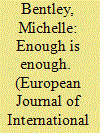

|
|
|
|
|
| Summary/Abstract |
The clash between national security and civil rights comprises one of the most controversial aspects of counter-radicalisation strategy. Analysts present this as a conflict between the need for restrictive security measures (for example, surveillance) and the need to uphold civil liberties (for example, privacy and freedom of speech). In responding to this dilemma, the article examines how this binary normative struggle impacts on the rhetorical presentation of counter-radicalisation policies – in particular, the UK Prevent Strategy and the rhetoric employed by UK Prime Minister and former Home Secretary, Theresa May. It argues that the normative environment has obliged May to construct rhetoric within the context of, what is termed here, normative invalidation. In facing two comparably compelling and related norms of action, May is necessarily required to invalidate or neutralise any norm not adhered to as an essential characteristic of rhetorical strategy. This is discussed in relation to the Strategic Narratives
|
|
|
|
|
|
|
|
|
|
|
|
|
|
|
|
| 2 |
ID:
153263
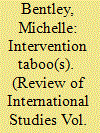

|
|
|
|
|
| Summary/Abstract |
Intervention comprises one of the most contentious issues in International Relations. This controversy results from the way normative understanding is structured around two key, but mutually exclusive, taboos: the moral expectation to respond in cases of humanitarian need and the protection of state sovereignty. In examining this dilemma, this article asks: what happens to the construction of rhetorical strategy, where that strategy seeks to justify intervention (or not), within a binary normative environment? It is argued that actors can only successfully construct a rhetorical case by engaging in, what is termed here, normative invalidation. In a binary situation, actors cannot adhere to both taboos. These taboos are so compelling, however, that actors must necessarily invalidate or neutralise any taboo not adhered to. This is discussed in relation to the Strategic Narratives paradigm and comparative case studies on the presidential rhetoric of Bill Clinton and Barack Obama.
|
|
|
|
|
|
|
|
|
|
|
|
|
|
|
|
| 3 |
ID:
179798
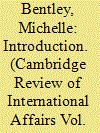

|
|
|
|
|
| Summary/Abstract |
This article introduces the special issue on Trump and unpredictability in international relations. It analyses each of the contributions to the special issue in turn, as they appear in the running order, while also elaborating on the intellectual and political context for the special issue as a whole. Paralleling the special issue, this introduction begins by setting out the problem of understanding the very notion of unpredictability itself as a general concept; turns to unpacking that theoretical complexity in more empirical terms by questioning how we can understand unpredictability in relation to Trump’s foreign policy; explores the contestation of that understanding by analysing alternative explanations for unpredictability and whether this constitutes doctrine; then delves more deeply into the specific notion of Madman theory, which comprises a critical and highly prominent sub-section of the unpredictability debate; and culminates in a more expansive focus on the impact of unpredictability as Trump’s foreign policy approach, specifically in relation to China.
|
|
|
|
|
|
|
|
|
|
|
|
|
|
|
|
| 4 |
ID:
114827
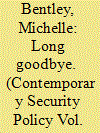

|
|
|
|
|
| Publication |
2012.
|
| Summary/Abstract |
This article responds to an earlier article by Christian Enemark to reassess the concept of weapons of mass destruction (WMD). How is the concept defined and can it be removed from policy and academic discourse? Firstly, this paper contests the reduction of WMD to mean a fixed set of armaments (nuclear, biological, and chemical weapons). In contrast to this essentialist approach, it uses American archival and policy examples to demonstrate that the concept has been defined in a wide variety of ways, choices that reflect the strategic and contextualized intent of the actors. Secondly, this article questions the assertion that the quality of strategic thought and security policy would be improved if the concept were abandoned. While the conflation of diverse weapons under the umbrella of WMD is problematic, the political nature of the concept's construction means its elimination is not straightforward. Conceptual change cannot be imposed independently of the way meaning is politically constructed. While not disputing the serious problems associated with allowing the WMD concept to survive, this article concludes that the real question here is one of context. Failing to address why and how it is used leads to underestimation of how likely removal is within the current discursive climate. As long as that value remains - as long as WMD is an effective resource for policymakers to shape security policy - there is little chance of being able to abandon the WMD concept in the foreseeable future.
|
|
|
|
|
|
|
|
|
|
|
|
|
|
|
|
| 5 |
ID:
189699


|
|
|
|
|
| Summary/Abstract |
Vladimir Putin does not play by the rules. The Russian president has long had a reputation for riding roughshod over the values of the international political community with uncompromising and macho disrespect. Analysts speak of the “Putin Doctrine”—a foreign policy of Russian dominance that is imposed regardless of widely accepted norms of state actor behavior. The Russian invasion of Ukraine is yet another example of Putin’s audacity. A NATO joint statement in March 2022 called the invasion “a fundamental challenge to the values and norms that have brought security and prosperity to all on the European continent.”
|
|
|
|
|
|
|
|
|
|
|
|
|
|
|
|
| 6 |
ID:
134483
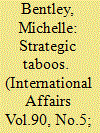

|
|
|
|
|
| Summary/Abstract |
This article examines US President Barack Obama's foreign policy rhetoric on Syria, specifically in relation to the threat of chemical weapons and the prohibitionary taboo surrounding their use. It contends that Obama's rhetorical construction of the taboo is not simply a commitment to the control of these horrific weapons (where such arms have been comprehended as so extensively vile as to preclude their employment), but that this also represents the strategic linguistic exploitation of these normative ideals in order to directly shape policy. By analysing of presidential speeches made during the conflict, it demonstrates that Obama has manipulated pre-existing conceptions of chemical weapons as taboo, and also as forms of weapons of mass destruction, to deliberately construct policy in line with his own political ambitions—most notably as a way of forcing a multilateral solution to the situation in Syria. This article challenges existing perceptions of the chemical weapons taboo as an inherently normative constraint, arguing that this instead comprises a more agency-driven construct. Static notions of the taboo must be abandoned and subsequently replaced with a framework of understanding that recognizes how the taboo can be used as a deliberate driver of foreign policy.
|
|
|
|
|
|
|
|
|
|
|
|
|
|
|
|
| 7 |
ID:
179800
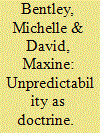

|
|
|
|
|
| Summary/Abstract |
This article tackles the question of whether US President Donald Trump’s foreign policy is informed by doctrine and, if so, what that doctrine is. In doing so, it positions itself with those who argue for the presence of a doctrine and specifically those who argue for a doctrine of unpredictability. The article problematises current understandings of doctrine, and the notion of unpredictability itself. The tendency to rely on the rational decision-making model is identified as a hindrance to analysis that acknowledges the possibility of a doctrine premised on a deliberate strategy of obfuscation and of wrongfooting both friend and foe. A four-pronged model of unpredictability is posited, consisting of inconstancy, inconsistency, unconstrainedness, and unreliability. This model encourages research unimpeded by prior ideas that treat Western foreign policy as rational and therefore expands the range of possible foreign policy doctrines that analysts contemplate.
|
|
|
|
|
|
|
|
|
|
|
|
|
|
|
|
| 8 |
ID:
120172
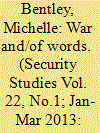

|
|
|
|
|
| Publication |
2013.
|
| Summary/Abstract |
This article provides an examination of the use of concepts- specifically "weapons of mass destruction" (WMD)-in security discourse. There are two key aspects to this discussion. First, the paper disputes current perceptions of WMD conceptual meaning. By analyzing the origins of the concept within the context of US foreign policy c.1945-48, it will be shown that, far from the fixed concept this has been assumed to be, WMD has been defined in a wide variety of ways. Second, this paper will demonstrate that these shifts in conceptual meaning are the strategic and intentional product of security actors. In the case of the concept's emergence, US policymakers exploited the concept as a political resource where its selective definition created an opportunity to manipulate and shape the post-Hiroshima arms-control regime. This article will discuss this in relation to the work of Quentin Skinner-in particular, his conception of the "innovating ideologist."
|
|
|
|
|
|
|
|
|
|
|
|
|
|
|
|
|
|
|
|
|